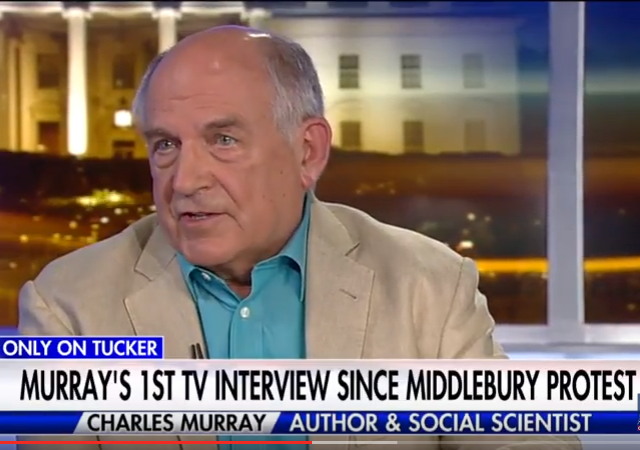Profs Deem Scholar’s Work Centrist – Didn’t Know it Was Written by Charles Murray
“neither controversial nor conservative”

This is hilarious. It’s like one of those videos where students don’t know they’re agreeing with Trump quotes.
The College Fix reports:
Professors judge scholar’s work. They deem it centrist. They had no clue it was written by Charles Murray.
Cornell University psychology professors Wendy Williams and Stephen Ceci have teamed up to pen a lengthy research paper on the troubling issues facing free speech rights on campuses today.
“Who Decides What Is Acceptable Speech on Campus? Why Restricting Free Speech Is Not the Answer,” published in May in Perspectives on Psychological Science, largely criticizes the suppression of free speech rights on campuses done in the name of left-wing inclusion and tolerance. In particular, the authors take on protestors’ arguments that violence is “justified by a higher moral responsibility to prevent marginalized groups from being victimized by hate speech.”
The article debunks the wrongly held belief by most college students that hate speech is not protected under the First Amendment by citing various legal precedents. The professors explain why mostly left-leaning mobs are so blind to reasonable debate, citing psychological hindrances such as “selective perception, confirmation bias, myside bias, illusion of understanding, blind-spot bias, groupthink/in-group bias, motivated skepticism, and naive realism.”…
We sent this transcript to 68 faculty members in the United States and Canada. … We did not tell these faculty that the transcription was a talk by Murray nor that it was connected to the disturbance at Middlebury College. We asked them to rate it on a 9-point scale (1 = strongly liberal, 5 = middle-of-the-road, 9 = strongly conservative). Fifty-seven of the 68 faculty members responded (plus two spouses, one of whom we included because she is also a professor). Their median rating of Murray’s talk was 5 (mean = 5.02, SD = 1.34). The most liberal rating was 2.5, and the most conservative rating was 8; of the 58 faculty ratings, 37 were between 4 and 6, or middle of the road. Thus, faculty in this convenience sample did not view Murray’s comments as dangerously conservative, and none of their written comments suggested anything remotely oriented toward hate speech.
… Of the 58 faculty members who were unaware that the talk was by Murray, 26 accompanied their ratings with comments. They frequently viewed the talk as a list of descriptive facts that were neither controversial nor conservative but mainly centrist or liberal:
 DONATE
DONATE
Donations tax deductible
to the full extent allowed by law.








Comments
If this study becomes widely known, the professors who described Murray’s remarks as non-controversial or liberal will be “Cultural Revolutioned” by their students or colleagues into recanting…thereby exposing their hypocrisy and personal corruption…again.
“This is hilarious.”
True. That. Thanks for posting this, Mr. LaChance.
I’m not surprised that most ratings were between 4-6 because that puts them right in the middle where they are safe no matter how they respond. If the thought police come knocking, it would be possible to “properly” explain their point of view.
I know progressives consider their efforts to squash free speech to be “liberal”, but the reality is that they have moved far away from truly liberal free speech ideals while conservatives have embraced them. So I find it interesting that there is an underlying assumption that professors giving it a high conservative rating are considering it to be “dangerously conservative”.
I also think the fact that it is clear that the article was written by an academic who speaks their language probably left them thinking it was the thoughts of one of their own (for example: “citing psychological hindrances such as “selective perception, confirmation bias, myside bias, illusion of understanding, blind-spot bias, groupthink/in-group bias, motivated skepticism, and naive realism”)
I think the 4-6’s may have been more of a reflection of the fear of not knowing HOW they were supposed to think about it. It doesn’t change the take-away noted, but I just find it interesting as we all know that had they been aware who wrote it, they would have rated it differently.